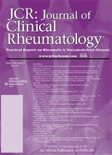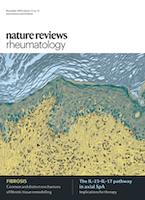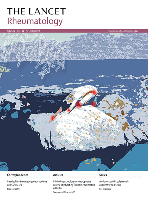
Journal of Rheumatic Diseases
Scope & Guideline
Shaping the future of rheumatic disease research together.
Introduction
Aims and Scopes
- Clinical Research in Rheumatology:
The journal publishes studies that explore the clinical characteristics, treatment responses, and outcomes of patients with various rheumatic diseases, contributing valuable data to the field. - Innovative Therapeutic Approaches:
A significant emphasis is placed on research involving new therapeutic strategies, including biologics, disease-modifying antirheumatic drugs (DMARDs), and emerging treatments for rheumatic conditions. - Epidemiology and Disease Patterns:
The journal includes epidemiological studies that investigate the prevalence, risk factors, and demographic characteristics of rheumatic diseases, particularly within specific populations. - Pathophysiology and Mechanistic Studies:
Research delving into the underlying biological mechanisms of rheumatic diseases, including genetic, immunological, and environmental factors, is a key focus area. - Patient-Centered Outcomes and Quality of Life:
The journal highlights studies that assess patient-reported outcomes, quality of life, and the psychosocial aspects of living with rheumatic diseases. - Multidisciplinary Approaches:
The journal recognizes the importance of multidisciplinary care in rheumatology, encouraging submissions that explore collaborations between rheumatologists, physiotherapists, and other healthcare providers.
Trending and Emerging
- Biologics and Targeted Therapies:
There is a growing body of research focusing on the effectiveness and safety of biologic therapies in various rheumatic diseases, indicating a trend towards personalized medicine and tailored treatment strategies. - Impact of COVID-19 on Rheumatic Diseases:
Research examining the implications of COVID-19 on patients with rheumatic diseases, including vaccination responses and disease management during the pandemic, has surged, reflecting the ongoing relevance of this global health crisis. - Machine Learning and Predictive Analytics:
The application of machine learning models and predictive analytics in rheumatology to forecast disease progression and treatment outcomes is emerging as a significant theme, showcasing the integration of technology in clinical practice. - Patient Education and Empowerment:
Studies emphasizing the importance of patient education, self-management, and shared decision-making in the management of rheumatic diseases are increasingly featured, highlighting a shift towards patient-centered care. - Long-term Outcomes and Quality of Life Assessments:
Research focusing on long-term outcomes, including renal prognosis and quality of life in patients with chronic rheumatic diseases, is becoming more prominent, reflecting a holistic approach to patient care.
Declining or Waning
- Traditional Treatments and Conventional Therapies:
Research focused solely on traditional DMARDs and older treatment modalities has decreased, likely due to the rise of biologics and targeted therapies, which are becoming the standard of care. - Basic Science without Clinical Relevance:
Studies that explore basic science aspects of rheumatology without a clear clinical application or relevance have become less frequent, as the journal aims to prioritize research that directly impacts patient care. - Single-Center Studies:
The prevalence of single-center studies has decreased as the journal favors larger, multi-center studies that provide more robust data and generalizability of findings. - Non-Interventional Observational Studies:
There appears to be a waning interest in non-interventional observational studies that do not offer new insights into treatment efficacy or patient outcomes, as the field moves towards more rigorous interventional research.
Similar Journals

Reumatologia Clinica
Transforming knowledge into practice in rheumatic health.Reumatologia Clinica is a distinguished journal dedicated to the field of Rheumatology, published by Elsevier España SLU. With its ISSN of 1699-258X and E-ISSN 1885-1398, the journal aims to disseminate pivotal research findings and clinical studies from 2005 to 2024, spotlighting advancements in the understanding and treatment of rheumatic diseases. Based in Barcelona, Spain, it plays a vital role in the academic community, ranking in the Q3 category for Rheumatology as of 2023, with a Scopus ranking of #44 out of 73, placing it in the 40th percentile. Although it operates under a traditional access model, the journal is committed to academic excellence, providing researchers, healthcare professionals, and students with invaluable insights that drive the field forward. Reumatologia Clinica serves as an essential resource for those looking to deepen their knowledge and contribute to the evolving landscape of rheumatologic research.

JCR-JOURNAL OF CLINICAL RHEUMATOLOGY
Advancing Knowledge in RheumatologyJCR-Journal of Clinical Rheumatology, published by Lippincott Williams & Wilkins, is a premier outlet dedicated to the field of rheumatology, recognized for its contributions and relevance among medical journals. Boasting an impact factor reflective of its vital role in disseminating innovative research, it currently holds a Q2 category ranking in Medicine (miscellaneous) and a Q3 ranking in Rheumatology as of 2023. With its convergence years spanning from 1995 to 2024, the journal aims to foster the advancement of knowledge in clinical practices, therapeutic advances, and patient management strategies concerning rheumatic diseases. Researchers, professionals, and students can access a wealth of benchmark studies and peer-reviewed articles, enhancing their understanding and collaboration within this dynamic field. By bridging clinical insights with rigorous research, the JCR-Journal of Clinical Rheumatology remains an important resource for advancing the understanding of rheumatologic disorders and improving patient care.

SCANDINAVIAN JOURNAL OF RHEUMATOLOGY
Advancing the Frontiers of Rheumatology ResearchThe Scandinavian Journal of Rheumatology, published by Taylor & Francis Ltd, is a prestigious peer-reviewed journal dedicated to advancing research in the fields of rheumatology, immunology, and related disciplines. With an ISSN of 0300-9742 and an E-ISSN of 1502-7732, this journal has established itself as a vital platform for disseminating significant findings and innovative approaches in the management of rheumatic diseases since its inception in 1959. As a recognized scholarly outlet, it currently resides within the Q2 category for Medicine (miscellaneous) and ranks #39 out of 73 in Rheumatology according to the 2023 Scopus assessments. This reflects the journal's commitment to high-quality research and its relevance in the scientific community. Although it does not provide Open Access options, the journal's rigorous selection process ensures that only the most impactful research reaches its audience, making it a crucial resource for researchers, clinicians, and students engaged in the exploration of rheumatological and immunological challenges. The journal's broad scope encompasses ongoing studies, clinical trials, and reviews that aim to enhance understanding and treatment of rheumatic conditions, promoting collaboration and knowledge-sharing among professionals in the field.

Reumatismo
Advancing knowledge in rheumatology for a healthier future.Reumatismo is a distinguished Open Access journal dedicated to the field of rheumatology, published by PAGEPRESS PUBL since 2001. With a rich history dating back to 1952, this journal has been pivotal in disseminating vital research on rheumatic diseases and related disorders. Based in Italy, Reumatismo has earned a reputation for its quality and relevance, achieving a Q3 category ranking in the 2023 Scopus metrics for Rheumatology, reflecting its significant contributions to the field. The journal is committed to providing a platform for the latest scientific developments and clinical innovations, thus aiding researchers, healthcare professionals, and students striving to enhance understanding and treatment of rheumatic conditions. For those seeking to access comprehensive research articles and studies, Reumatismo boasts an open access policy, ensuring that knowledge is freely available to all, fostering collaboration and advancement in rheumatology worldwide.

BMC Rheumatology
Empowering research to transform rheumatic disease treatment.BMC Rheumatology is a vital open-access journal that has been disseminating high-quality research in the field of rheumatology since its inception in 2017. Published by Springer Nature, this journal provides a platform for original research, reviews, and clinical studies that advance the understanding and treatment of rheumatic diseases. With a commendable impact factor and ranked in the second quartile (Q2) for Rheumatology as of 2023, BMC Rheumatology exemplifies expertise, contributing significantly to the medical community's dialogue. Researchers, professionals, and students will find valuable insights within its pages, as it caters to a diverse audience through its commitment to open-access publishing, facilitating knowledge sharing without barriers. Based in the United Kingdom and indexed in Scopus, the journal continues to thrive with a steady convergence of academic excellence through 2024, making it an indispensable resource for those dedicated to advancing rheumatological science.

Rheumatology & Autoimmunity
Transforming insights into impactful treatments.Rheumatology & Autoimmunity, published by WILEY, is an emerging academic journal that delves into the intricacies of rheumatological diseases and autoimmune disorders, providing a critical platform for researchers and practitioners within the field. With an ISSN of 2767-1410 and E-ISSN 2767-1429, the journal aims to disseminate cutting-edge research in both clinical and laboratory settings, enhancing knowledge and understanding among professionals and scholars. Although currently classified in Q4 for Immunology and Allergy, and Q3 for Internal Medicine and Rheumatology as of 2023, the journal is positioned for growth and greater visibility in the scientific community. The three-year publishing span from 2021 to 2024 signifies a commitment to addressing contemporary issues and fostering collaboration among various disciplines related to immunology. As an open access journal, it provides wide accessibility, ensuring that groundbreaking research is available to a broad audience. This journal is poised to become a vital resource for those dedicated to advancing the understanding and treatment of autoimmune conditions.

Current Rheumatology Reviews
Elevating standards in rheumatic disease research.Current Rheumatology Reviews is an esteemed journal dedicated to publishing comprehensive reviews on advancements in the field of rheumatology. Established by Bentham Science Publishers, this journal has become a vital resource for researchers, clinicians, and students seeking to stay abreast of the latest developments and therapeutic strategies from 2006 to 2024. Located in the United Arab Emirates, it caters to a global audience, delivering insights that have been pivotal in shaping clinical practices. With an impact factor reflective of its Q3 status in Rheumatology by 2023, the journal ranks #46 out of 73 in the Scopus database, positioning it in the 37th percentile in the discipline. Although it operates without open access, its high-quality content ensures that each article undergoes rigorous peer review, making the Current Rheumatology Reviews a trusted platform for disseminating critical research findings and reviews that drive forward the understanding and treatment of rheumatic diseases.

Nature Reviews Rheumatology
Connecting global expertise in rheumatology.Nature Reviews Rheumatology is a premier academic journal published by NATURE PORTFOLIO, dedicated to the field of rheumatology. With an impressive impact factor reflecting its high citation rate and relevance within the scientific community, it ranks in the Q1 category for rheumatology, showcasing its essential role in disseminating cutting-edge research and reviews. The journal serves as a vital resource for researchers, clinicians, and students alike, presenting comprehensive articles that cover the latest developments, therapeutic advancements, and emerging trends in rheumatic diseases. With access options, including open access, it ensures that valuable insights are within reach for all stakeholders in the field. Situated in the United Kingdom and intersecting with a global audience, Nature Reviews Rheumatology stands as an authoritative voice, fostering education and innovation to improve patient outcomes and enhance the understanding of rheumatological conditions.

Lancet Rheumatology
Advancing knowledge in rheumatology and immunology.The Lancet Rheumatology, published by Elsevier, is a premier academic journal dedicated to advancing the understanding of rheumatology and immunological diseases. Launched in 2019, this esteemed publication has quickly become a leading source of research, achieving an impressive Q1 ranking in both the fields of Rheumatology and Immunology as of 2023. With Scopus rankings placing it at #2 out of 73 in Medicine - Rheumatology and #6 out of 233 in Medicine - Immunology and Allergy, the journal serves as an essential platform for disseminating high-quality, peer-reviewed articles that address the latest findings and clinical practices in these domains. The journal, accessible in print and online, is committed to fostering knowledge and collaboration among researchers, healthcare professionals, and students alike, making it an invaluable resource for those seeking to deepen their expertise in rheumatology and its interrelated fields.

ZEITSCHRIFT FUR RHEUMATOLOGIE
Connecting researchers and clinicians for better rheumatic disease outcomes.ZEITSCHRIFT FUR RHEUMATOLOGIE, published by Springer Heidelberg, serves as a vital platform in the field of rheumatology, providing researchers, clinicians, and students with cutting-edge findings and discussions related to the diagnosis, treatment, and management of rheumatic diseases. Since its inception in 1974 and continuing until 2024, this journal retains its commitment to disseminating significant scientific work within this specialized domain. Although it is currently categorized in the Q4 quartile for Rheumatology and ranks 47 out of 73 in Scopus, reflecting its burgeoning presence, the journal is dedicated to evolving and gaining prominence in the academic community. By offering valuable insights and fostering scholarly discourse, ZEITSCHRIFT FUR RHEUMATOLOGIE plays a crucial role in advancing rheumatology research and enhancing patient care practices worldwide. The journal presents an opportunity for its readers to engage with contemporary studies and enrich their understanding of rheumatic ailments.